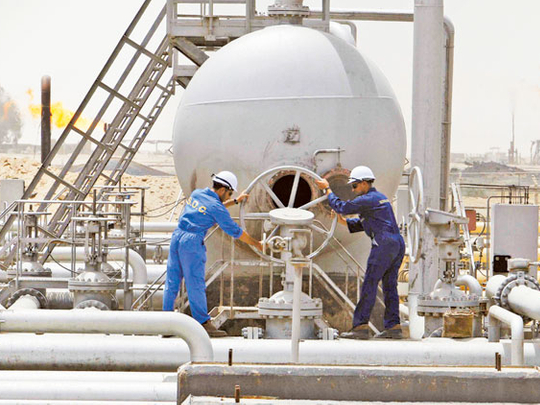
London: Oil prices edged up towards $113 (Dh414.71) a barrel on Friday, but analysts and traders said a downside shift was likely because the UK’s Buzzard oilfield was expected to restart this weekend while the demand outlook remained weak.
At 1000 GMT December Brent crude oil futures were up
42 cents at $112.84 a barrel. US crude was up 5 cents at $92.15 a barrel.
“We have enough supply. Short of any geopolitical or economic shocks, the market will probably grind lower this month,” said Jeremy Friesen, a commodities strategist at Societe Generale in Hong Kong.
Nexen, operator of Buzzard, Britain’s largest oilfield, said it would resume output on October 21, increasing the supply of crude that underpins the Brent contract.
“The concern is that demand won’t be strong enough to absorb the rapid increase in supply,” said Carsten Fritsch, an energy analyst at Commerzbank in Frankfurt.
Maintenance at the Buzzard field tightened supply through late September and early October, strengthening prompt Brent prices and pushing the spread between the European marker and US crude to its widest in a year.
Tony Machacek, a broker at Jefferies Bache in London, said this still helpe d support prices o n Friday, with widespread deferrals of Forties crude cargoes for October loading.
Both Machacek and Fritsch described the market as rangebound as numerous conflicting supply and demand factors continued to offset each other.
“There’s a lack of conviction in movements either way, so we have seen some flip-flopping this week with a $1 move up, then a $1 move down,” Fritsch said.
Ole Hansen, senior commodity strategist at Saxo Bank, agreed. “The market is not able to find any particular drivers so there is not much incentive to push it in either direction,” he said.
Brent closed 80 cents down on Thursday after the dollar rose and Goldman Sachs revised its 2013 forecast for Brent down to $110 from $130 a barrel.
“They went neutral after being one of the big bulls — that helped drive the market lower. But the Brent-WTI spread is widening now, so it is basically a Brent move today,” Hansen said.
Dominick Chirichella of the Energy Management Institute, suggested that oil markets were entering the “election zone”, when market participants start to neutralise their trading books because of uncertainty around the outcome of the US presidential election.
Eurozone progress
Signs of progress in the Eurozone debt crisis created a relatively benign mood across the markets on Friday, with European leaders taking steps towards establishing a single banking supervisor.
This opens the way for the bloc’s rescue fund to inject capital directly into ailing banks. “It’s difficult to see how the market will take this move as anything but a positive,” said Gary Jenkins, an analyst at Swordfish.
Oil prices also gained support from a shutdown at TransCanada Corp’s Keystone pipeline, which moves Canadian crude from Alberta to the central United States.
“The Keystone pipeline is expected back online by the 20th, so we’re watching how this will turn out,” said Ryoma Furumi, a commodities sales manager at Newedge Japan.
Machacek added that US RBOB gasoline, which is often traded against Brent, had stabilised following a major sell-off. This was triggered by the announcement that US winter specification gasoline could be sold earlier than usual to ease extreme product shortages.
“Maybe we are seeing some end-of-the-week short — covering in RBOB,” he suggested.
Tensions between Syria and Turkey as well as Iran’s nuclear ambitions are also keeping a floor under prices.
European Union governments imposed fresh sanctions this week against major Iranian state companies in the oil and gas industry and tightened curbs on the central bank, cranking up financial pressure on Tehran.
Iran is believed to be further increasing its uranium enrichment capacity, Western diplomats said, in another sign Tehran is defying international demands to rein in its nuclear programme.












